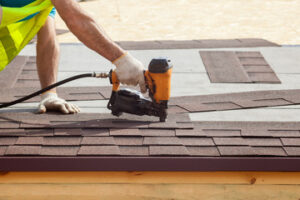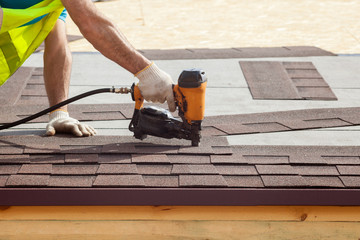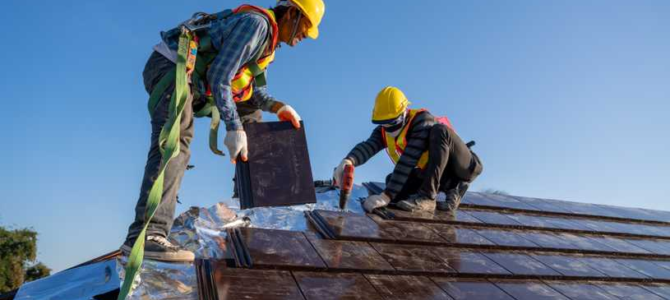The roof is a prominent feature of any home, and well-executed roofing services can boost its market value. They can also reduce the need for costly repairs and maintenance and enhance curb appeal.

Local roofing contractors are familiar with the local climate and able to recommend the best materials for your roof. They can also negotiate with nearby suppliers for discounts on materials and labor. Contact Roofing Company Brentwood TN for professional help.
When you hire a roofing contractor, you want to be sure that the person you’ve hired can perform quality work and will meet your expectations. Checking online reviews and ratings is one way to gauge a roofing company’s reputation and customer satisfaction levels. Detailed testimonials can also reveal important information, such as the roofing company’s communication practices and willingness to address issues that arise during a project.
Licensing is another key indicator of a commercial roofing contractor’s expertise. Ask potential contractors about their state-specific licensing requirements, as well as whether they’re familiar with the specific roofing system you’re interested in using. Inquiring about past projects and visiting those sites can also help you understand a roofing company’s level of experience and capability.
Lastly, consider the roofing company’s safety protocols and knowledge of local building codes. Choosing a roofing company with an excellent safety record will minimize risks of accidents and property damage that could delay or derail your project.
Hiring the right roofing company can make your entire construction project more efficient and successful. Look for a roofing company that has a track record of high-quality work and is willing to stand by their workmanship with a warranty.
Additionally, make sure the roofing company you choose can handle your project timelines and demonstrates flexibility when it comes to scheduling. Inquire about their availability during the summer and fall, when weather conditions are most favorable for roofing projects. They should also be able to provide clear and comprehensive quotes that outline all costs and project specifications. Finally, ask about manufacturer certifications, as these can indicate a roofing company’s dedication to quality and may offer better warranties.
Reputation
When you’re dealing with a roofing company, you want to be sure that they have a solid reputation. You’ll want to check out their online reviews on platforms like Google, Yelp, and Facebook. Customer reviews offer unfiltered insight into the experiences of previous clients. A preponderance of positive reviews can signal that a roofing company provides quality service.
Another great way to gauge a roofing contractor’s reputation is by checking their history with local professional organizations, such as the Better Business Bureau (BBB). The BBB collects information about businesses and rates them on trustworthiness, honesty, and transparency. A BBB rating of A+ typically indicates a high level of trustworthiness and ethical practices.
Another important thing to look for in a roofing company is whether they have a valid license and insurance. A reputable roofing company will always have these credentials in place to protect their customers from liability. This is especially important during the winter, when snow, ice, and freezing temperatures can lead to roof damage. Licensing and insurance are a guarantee that the roofing company is qualified and knowledgeable to handle any job they take on. The last thing you want is to hire a roofing company that is not properly licensed and insured, which can lead to expensive legal problems down the road.
Insurance
A roofing contractor who is licensed, bonded and insured can be trusted to do a good job. However, there are many risks involved in the roofing industry, and it’s important for a roofing company to have liability insurance. This protects the company in case the roof is damaged during construction or after the work is done. It also protects homeowners in case the roofing company does a bad job.
Besides being licensed and bonded, a roofing company should have general liability insurance, workers’ compensation insurance, commercial property insurance, and builders risk insurance. Workers’ compensation insurance covers medical expenses and lost wages for employees who are injured or become ill while working. It is a legal requirement in New York City for any business with employees. The cost of this insurance is based on the size of the company and claims history.
General liability insurance is important for any business, but it’s especially essential for a roofing company. This type of insurance provides protection against third-party claims for bodily injury, property damage, and advertising injuries. In addition, it covers the costs of legal fees and judgments awarded against the roofing company.
Commercial property insurance protects a roofing company’s tools, equipment, and materials against fires, theft, vandalism, and weather-related damages. It’s essential for roofing businesses that have warehouses or storage yards. Inland marine insurance is another type of commercial insurance that covers equipment and materials while they’re in transit or stored off-site. This is useful for roofing companies that transport their materials to and from clients’ houses.
A roofing company should also carry surety bonds, which are similar to a contract performance bond. These bonds guarantee quality work and meet licensing requirements. A roofing company without these bonds can be sued by clients if the company doesn’t do a good job or causes damage to their home. The cost of this type of insurance varies, depending on the amount of coverage and how secure the bond is. A reputable insurance agency can help you find the best coverage for your roofing company’s needs. They can also provide a detailed list of policies and premiums.
Warranty
The warranty provided by a roofing company is a valuable safeguard against roof issues. However, it is important to understand the limitations of roof warranties and how they work. Insights from roofing experts help homeowners better manage their expectations and protect their investment.
The best roofing warranties typically provide extensive protection, including non-prorated periods and long-standing coverage for materials. They also allow transferability, bolstering a home’s market value. Moreover, top-rated roofing warranties include comprehensive protection against roof leaks and structural damage caused by natural disasters.
There are four major types of roofing warranties available, ranging from material-only warranties to full system warranties. Each type of roofing warranty offers different levels of protection and covers varying components of the roof. Material-only warranties typically cover the cost of the roofing materials for a limited time period. However, they do not cover installation or repairs. Full system warranties, on the other hand, include both materials and labor in their scope of protection. These warranties can last up to 50 years or even a lifetime.
Lastly, workmanship warranties offer a safety net for issues that arise due to improper installation or construction methods. These issues may lead to costly and lengthy repair or replacement costs. Homeowners should be aware that certain activities can void a roof’s warranty, such as improper ventilation and high-pressure washing.
When selecting a roofing company, it is crucial to understand the differences between manufacturer and contractor warranties. Manufacturer warranties usually cover manufacturer defects in shingles or other roofing materials for a limited time period, while contractor warranties focus on workmanship quality and installation procedures.
Homeowners can also opt for extended warranties that provide additional protection against roofing problems. These warranties are often offered by top-rated roofing companies and require a minimum of 25 years for materials or a lifetime for workmanship. They also stipulate that the roof must be installed by a certified contractor following strict standards.
To ensure that a roofing company is reputable, it should have a good reputation in the community and provide a variety of roofing services. The best roofing companies should be licensed and insured and be able to provide references from previous clients. Additionally, they should have a written warranty that is provided to the customer upon signing the contract.


